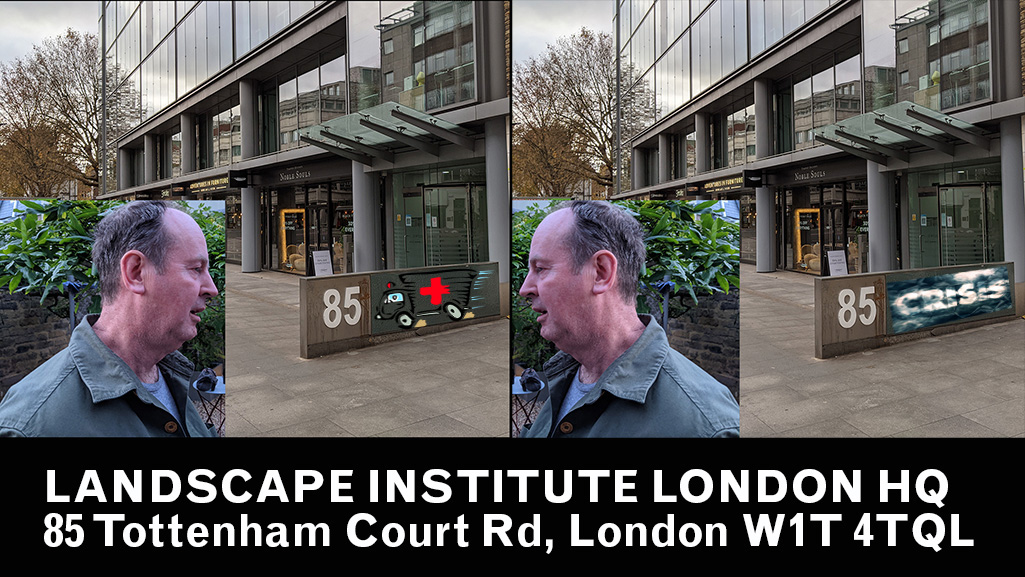Landscape Institute in Crisis

- This is the worst crisis in the 93-year history of the UK Landscape Institute. Please see this page for a set of Videos about the Landscape Institute Crisis and this page to see why 6 Past Presidents are so strongly opposed to the current leadership of the LI
- One can understand the desire to shovel stuff under carpets but the subject line of the email which informed members of the crisis was ridiculous. It was Update to Landscape Institute members on Advisory Council decision. The truth behind the fig leaf was LI’s leaders decide to overturn the democratic choice of its membership. Apart from burning books there are few worse things leaders can do. As Thomas Jefferson, who was skilled in landscape architecture, explained his view: It is my principle that the will of the majority should always prevail.
- Brodie McAllistair was voted Landscape Institute President Elect in June 2021 and became our President on 1st July 2022, notwithstanding an attempt by the LI Advisory Council, led by its Board of Trustees, to try and overturn the 2021 election result. The Board appears to have disliked Brodie and authorised a large sum of money (£250,000?) to be spent in trying to stop him becoming president. The size of the lawyer’s bill has not been revealed yet been revealed but a senior lawyer costs about £5,000/day and Russell-Cooke have been working on the case since February with hundreds of pages of text prepared.
- Six past presidents of the LI (PPLIs) wrote to protest against the expenditure and against the attempted dismissal of Brodie from the office to which he was elected. You can read their letter here.
- I am in full agreement with the points made by the Six Presidents – and greatly regret that the Landscape Institute, which I joined 53 years ago, will not benefit from the imaginative view of its future put forward in Brodie’s election manifesto https://youtu.be/2nuVlQr9NGE . See also: Brodie in conversation with Past President Merrick Denton-Thompson https://www.youtube.com/playlist?list=PL0tjuOrn4n23wXp6eIdd1jup4mff0LIz9
- I wish that instead of preparing a case against the President Elect, the £250k had been spent on promoting the landscape profession: as set out in the Wikipedia article, this was the primary reason for establishing the Institute. Clause 2 of its the 1930s Constitution stated that: ‘The Institute shall be formed to promote the study and general advancement of the Art of Landscape Architecture in all its branches, and to serve as a medium of friendly intercourse between the members and others practising or interested in the Art’. It is highly regrettable that friendly intercourse between members is now very difficult and that we have been brought low by what looks like a boardroom battle.
- As set out in the below video, landscape architects have had difficulty explaining what they do since its early days. Frederick Law Olmstead, Thomas Mawson (our first president) and Sir Geoffrey Jellicoe (who founded the International Federation of Landscape Architects) all lamented that ‘nobody understands us’. Dealing with this problem would be an excellent use for the money raised by membership subscriptions. Spending the money on pursuing a trivial case against a man who wanted to give his time and his imagination to expanding the scope of landscape architecture is not only a complete waste of money: it will cause serious public damage to the reputation of the Landscape Institute. I can understand why the LI employed a firm of ‘reputation consultants’ should ameliorate the harm. But a far better course of action would have been to take the advice which six distinguished past presidents gave to the the Advisory Council in the run up to its fateful decision. Instead of doing this the LI’s top brass criticised the six presidents for giving their opinions to the LI Board of Trustees and the LI Advisory Council.
- This was a very dark day in the history of British landscape architecture.
The LI dealt with its issues as a Whistleblowing incident. But it does not fall within the usual understanding of such incidents.
https://www.britannica.com/topic/whistleblower. Similarly, the UK government website states that “If you’re a charity worker and report certain types of wrongdoing, this is known as ‘whistleblowing’. Your employer must not treat you unfairly at work because you blow the whistle. If the information you report, and how you report it meets specific requirements the law will protect you. You must:
- be a worker, not a volunteer
- reveal the information in the public interest
- reveal certain types of wrongdoing
- tell the right person or organisation
The decision to classify the actual complaint against Brodie as a ‘Whistblowing Disclosure’ was anomalous, as was the decision to keep its substance confidential. The identity of Whistleblowers is protected so that employers cannot discriminate against them, which obviously could not happen if the LI Wistleblower was, as many members believe, a senior member of the Board of Trustees. Confidentiality can come from Common Law and from Non Disclosure Agreements. But for information to be of a confidential nature, it must have “the necessary quality of confidence”. Merely describing a document as confidential, which is what the LI did, does not of itself turn information that is not inherently confidential into confidential information.
